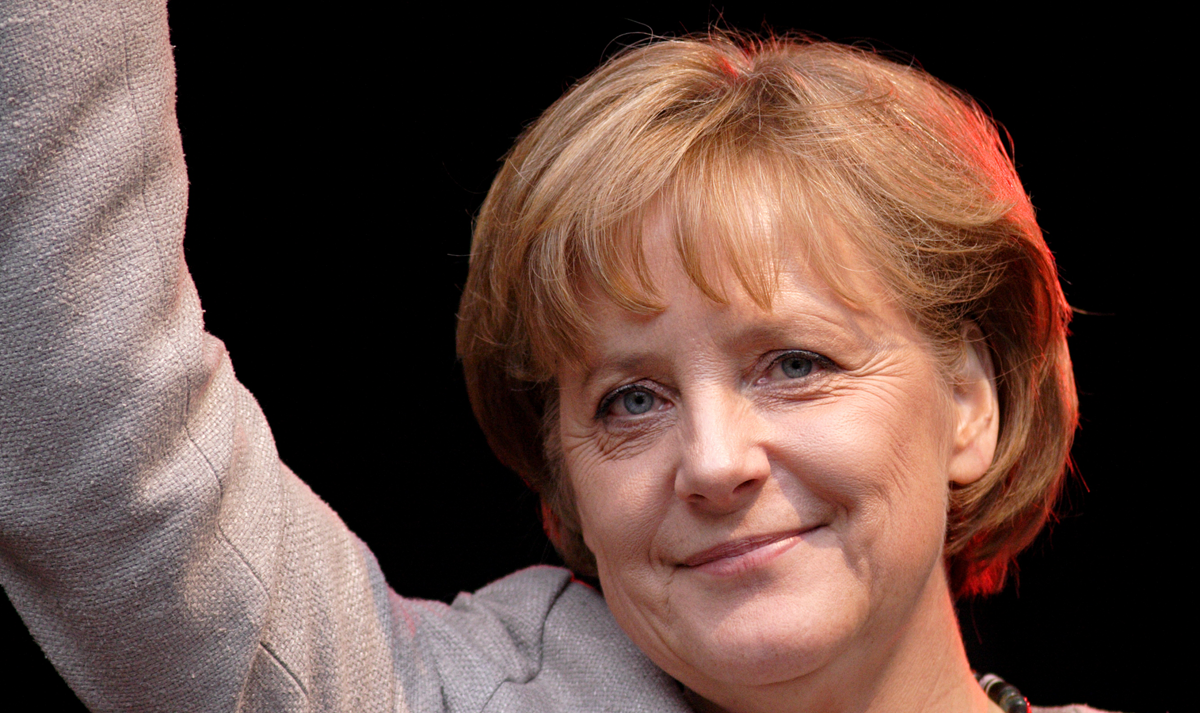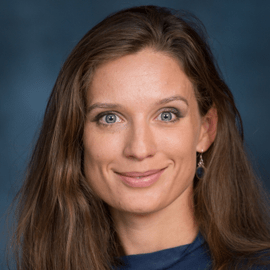
Germany’s Refugee Crisis in the Era of Trump: Will Mutti Merkel Manage?
By Julia Khrebtan-Hörhager, Ph.D.
Running the risk of violence, exploitation, imprisonment, and death, almost 2 million refugees arrived in Germany between 2014 and 2017. Located in the very heart of Europe, Germany stoically responded to the biggest refuge crisis in recent European history, establishing itself as the ultimate humanitarian leader and accepting the overwhelming majority of refugees (mostly from Syria, but also from Afghanistan and other war-torn and/or politically and economically troubled locations). At the beginning of the crisis, Chancellor Angela Merkel amazed the world by opening Germany's borders, with her famous mantra Wir schaffen das! (We can do this!), indicating an uncompromising aim to prioritize the needs of Others. Germany’s own Other – an Easterner, a woman, and a pastor’s daughter – Merkel decided to help the world’s “other Others” and establish a new image of her country as a Willkommenskultur (a culture of open welcome). And, indeed, thousands of ordinary Germans extended extraordinary empathy and generosity to the new arrivals. However, as the number of refugees continued to swell, and as the European Union failed to provide a unified policy in support of the German approach, the slogan was eventually extended into Wir schaffen das, aber wie? (We will manage, but how?). In an ironic twist of history, Germany found itself divided again – this time, by its policies about and communication patterns regarding refugees and immigration.

Within these heated debates, countless advocates reframed old and produced new concepts, ranging from Bunte Republik Deutschland (colourful Republic of Germany) to Flüchtlingsrepublik Deutschland (refugee Republic of Germany). The Chancellor was often referred to as Mutti Merkel (Mother Merkel) and sometimes as Mutter Theresa (Mother Theresa), yet she was also degraded to Mutter Terorresa (Mother Terror/-resa). As these labels attest, the status of both Merkel and the German Chancellery in general was up for debate, with the arguments driven in large part by responses to the refugee crisis.
On the one hand, the Chancellor established herself as the strongest voice of the values of a liberal and united Europe. Many political leaders interpreted Merkel’s policy of open borders as heroic, including former U.S. President Barack Obama, who chose as his last official visit to travel to meet with the Chancellor, his closest foreign ally and, in his own words, “the new leader of the free world.” For many, Mutti’s ideological and rhetorical steadfastness under growing pressure is a beacon of hope in the tormented continent, with its fast-growing tendencies toward nationalism, populism, and separation. In addition to being a role model for Europe and the world, Merkel represents the new, open, liberal, and inclusive German Heimat with a friendly face and a clear emphasis on universal democratic values rather than pure German national interests. Importantly, “while the policy decisions required by [Merkel’s] course have come at the cost of the resurgence of a new rightwing populist movement – manifested by painful defeats in a string of state elections – Germany’s political landscape remains more stable than that in Britain or France” (Olteramann, 2016, para 6). And, economically, Germany continues to be the “European engine.” So, in many ways, Mutti Merkel has already managed some miracles.
On the other hand, although Germany’s standing remains more stable compared with other European nations – consider especially Brexit and the highly-debated potentiality of Frexit – it is also starkly overshadowed and continuously challenged by Germany’s own divided attitudes toward the country’s drastically changing demographics. In 2015, Bavarian leaders accused Merkel of ruining Germany with her open-door policies. After the Chancellor’s public address about Islam being a part of German culture, the German television channel ARD depicted Angela Merkel wearing mock Islamic dress against a backdrop of minarets on the Berlin skyline (Connolly 2016, para 1). The Chancellor has been sharply criticized at home for allowing too many migrants into the country, often without screening or background checks. American President Donald Trump has repeatedly described Merkel’s refugee politics as a “disgrace,” and Russian President Vladimir Putin suggested that the Chancellor was ruining her own country. In reaction to the December 2016 terrorist attack in Berlin – when a truck was driven into a Christmas market, killing 12 people and wounding 48 others – Frauke Petry, leader of the far-right party AfD (Alternative für Deutschland/Alternative for Germany) stated that “‘Germany is no longer safe’ and told the country that it would be Angela Merkel’s ‘duty to tell you that’” (cited in The New York Times, 2016, December 20, para 10). The attack involved a public space that serves as an emblem of common ground and Christianity. Although Chancellor Merkel and Interior Minister Thomas de Maizière said the violence must not be allowed to change Germany’s free and open society, the issue of national security became the key topic of the German national rhetoric. Much like the situations in post-9/11 America or following the terrorist attacks in Paris, balancing liberty and security has become one of Germany’s most challenging tasks. As a consequence of these debates, the long-standing notion of Willkommenskultur has been problematized, perhaps to the point of no return.
When German political leaders joined the mourners following the attacks inside of Gedächtniskirche (Keiser Wilhelm Memorial Church), German President Joachim Gauck said that “the church, which was badly bombed during the Second World War, had suffered ‘another open wound’ but stood witness to Berlin’s ability to overcome difficult times’” (cited in Connolly & Oltermann, 2016, para 28). Interior Minister Thomas de Maizière encouraged the populace not to retreat: "Don't let them control our lives with fear" (cited in Weiland & Wittrock, Spiegel, 2016, December 20, para 3). Bavarian CSU (Christian Social Union, the sister party to Merkel's Christian Democrats) Leader Horst Seehofer had a different reaction; he called for a review of Germany's security policies. "We owe it to the victims, to those affected and to the whole population to rethink our immigration and security policy - and to change it," Seehofer said (cited in Aljazeera, 2016, December 20, para 4). Chancellor Merkel’s message was an entreaty to Germans to avoid casting an eye of suspicion on all refugees in the country. She asked the Germans to distinguish between terrorists and refugees, and to keep faith with her version of what it means to be German. "We will find strength for the life we want to live in Germany,” she said, “free, united, and open" (cited in Weiland & Wittrock, 2016, December 20, para 3).
“Free, united, and open” seem to be the exact opposite of the priorities set by the new U.S. President Donald Trump, whose vision of “America first” seems to foreshadow a coming isolationism. Despite Trump’s harsh rhetoric against Others, Merkel’s first message to Trump was an urgent reminder about the shared values of the two countries: "Germany and America are bound by common values — democracy, freedom, as well as respect for the rule of law and the dignity of each and every person, regardless of their origin, skin color, creed, gender, sexual orientation, or political views.” Sadly, the Chancellor’s rhetoric fell on deaf ears, considering Trump’s proposed travels bans and his imagined immigrant-blocking Wall.
While the U.S. president moves toward isolationism, Merkel’s Germany resists, but the new nationalistic and populist tendencies sweeping Europe are affecting Great Britain, France, the Netherlands, and others. Willkommenskultur is fragile, yet with the growing protests in Germany, in the United States, and around the world, there is still hope that humanity will win and that Mutti will manage.
References
- Anonimous. (2016, December 20). Ankara, Berlin, Zurich: A day of terror. The New York Times.
- Anonimous. (2016, December 20). Merkel says Christmas market incident is a ‘terrorist act.’ Aljazeera.
- Connolly, K. (2010, October 17). Angela Merkel declares death of German multiculturalism. The Guardian.
- Connolly, K. & Oltermann, P. (2016, December 20). Berlin Christmas market attacker still on the loose, says police. The Guardian.
- Martínez Guillem, S. (2011). European identity: Across which lines? Defining Europe through public discourses on the Roma. Journal of International and Intercultural Communication, 4(1), 23-41.
- Oltermann, P. (2016, November 17). Germany daunted by great expectations as Obama passes baton to Merkel. The Guardian.
- Steinmeier, F.-W. (2016, July/August). Germany’s new global role. Foreign Affairs.
- Sheeler, K. H., & Anderson, K. V. (2014). Gender, Rhetoric, and International Political Systems: Angela Merkel's Rhetorical Negotiation of Proportional Representation and Party Politics. Communication Quarterly, 62(4), 474-495.
- Sheeler, K. H., & Anderson, K. V. (2013). Woman president: Confronting postfeminist political culture (Vol. 22). Texas A&M University Press.
- Weiland, S., & Wittrock, P. (2016, December 20). Germany’s nightmare, Merkel’s nightmare. Der Spiegel.
- Yoder, J. A. (2011). An Intersectional Approach to Angela Merkel's Foreign Policy. German Politics, 20(3), 360-375.
Online Resources
- Official Website of Chancellor of the Federal Republic of Germany (in two languages)
- Council for European Studies
- German Marshall Fund of the United States
- International Rescue Committee
- Atlantic Council
- Human Rights Watch
- Asylum Access
- Center for Victims of Torture
- The Bellevue/NYU Program for Survivors of Torture
- Amnesty International
Media Resource: Issue Experts
- Karrin Anderson, Colorado State University
- Clarke Rountree, University of Alabama
- Mary Grace Antony, Schreiner University
- Susana Martinez Guillem, University of New Mexico


